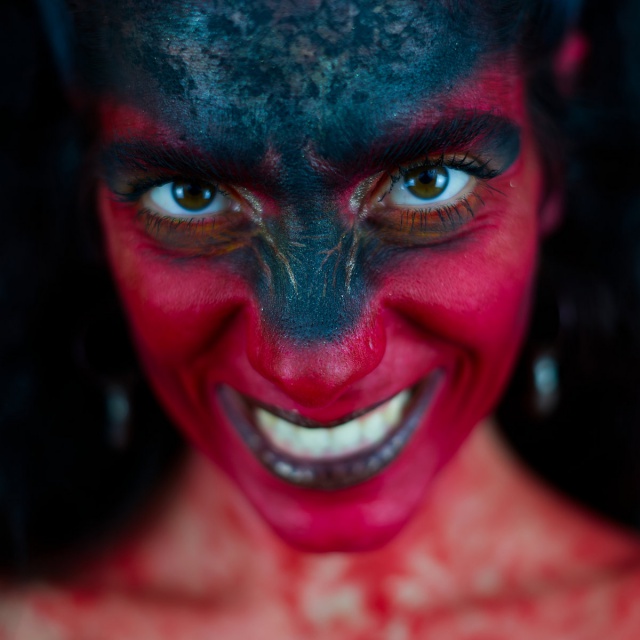Dalila Kayros – KHTHONIE

Reads: 1049 times
80%
I first wrote down my impressions before discovering the meaning behind the title — and yet it was as if my intuition had already known. KHTHONIE is derived from the Greek word khthonios (χθόνιος), meaning "of the earth" or "from the underworld." It refers to powers dwelling beneath the surface — dark, primal, feminine, subconscious. And now I understand: this is exactly what I had felt. That this wasn’t merely an album — it was a summoning.
I experienced this project live only once — at the 25 Jahre Club Debil festival in Dresden — and it left an imprint like a dream that felt more remembered than seen. Dalila Kayros did not perform. She conjured. She inhabited each moment like a priestess possessed by sound, weaving spells of fire, soil, shadow, and breath. That same power floods every moment of KHTHONIE. The album unfurls like a ceremonial veil. Sound becomes movement. Kayros doesn’t just sing — she channels. Her voice winds through the body like smoke through forest undergrowth. On one track she whispers in a forgotten tongue; on another, she erupts with volcanic force. Feral, sacred, eerie, beautiful — her voice is the axis around which this sonic ritual rotates.
Minimalist moments, like "NEA," show restraint as a form of power. The quiet is alive, buzzing. Every beat deliberate. Each silence weighty. In tracks like "LEVIATAN" and "LAMIA," her voice becomes many — child of chaos, mourning widow, fire-eyed oracle. There’s madness here, but it is sacred. There’s rage, but it is transformative. Dalila is at once a glowing fae, a mourning siren, and a thunderous storm. She evokes images of Bacchic rituals, forgotten goddesses, and wise witches who speak in wind and bone.
And then there’s "SAKRAMONADE" — part Italian, part Sardinian — it doesn’t merely resemble a spell; it is one. With lines like "Sakra sangre d’ira scura" (sacred blood of dark fury), it becomes clear that this is not about narrative but invocation. About voices that rise from soil and sea. About memory buried in DNA. Kayros isn’t singing a song. She is listening to something older, deeper, and letting it sing through her.
Each track is built with electronic wizardry by Danilo Casti, crafting not songs but landscapes. Soundscapes layered with feral rhythms, industrial growls, and whispering chaos. The textures are visceral, physical — you don’t just hear this album, you feel it on your skin like mist or ash. The closing piece, "CORPUS SONORUM," arrives like dawn after an ancient ritual. Choral, reverent, it settles the dust while letting the spirits linger. It does not resolve — it reveals.
KHTHONIE is raw, hypnotic, fierce, and deeply sensual. It’s a sensory journey of blood and shadow, a voice that is not afraid of its own darkness. Dalila Kayros is not merely an artist. She is a medium for something earth-born and eternal.
Step into this album — and you may just remember something sacred you never knew you’d forgotten.
I experienced this project live only once — at the 25 Jahre Club Debil festival in Dresden — and it left an imprint like a dream that felt more remembered than seen. Dalila Kayros did not perform. She conjured. She inhabited each moment like a priestess possessed by sound, weaving spells of fire, soil, shadow, and breath. That same power floods every moment of KHTHONIE. The album unfurls like a ceremonial veil. Sound becomes movement. Kayros doesn’t just sing — she channels. Her voice winds through the body like smoke through forest undergrowth. On one track she whispers in a forgotten tongue; on another, she erupts with volcanic force. Feral, sacred, eerie, beautiful — her voice is the axis around which this sonic ritual rotates.
Minimalist moments, like "NEA," show restraint as a form of power. The quiet is alive, buzzing. Every beat deliberate. Each silence weighty. In tracks like "LEVIATAN" and "LAMIA," her voice becomes many — child of chaos, mourning widow, fire-eyed oracle. There’s madness here, but it is sacred. There’s rage, but it is transformative. Dalila is at once a glowing fae, a mourning siren, and a thunderous storm. She evokes images of Bacchic rituals, forgotten goddesses, and wise witches who speak in wind and bone.
And then there’s "SAKRAMONADE" — part Italian, part Sardinian — it doesn’t merely resemble a spell; it is one. With lines like "Sakra sangre d’ira scura" (sacred blood of dark fury), it becomes clear that this is not about narrative but invocation. About voices that rise from soil and sea. About memory buried in DNA. Kayros isn’t singing a song. She is listening to something older, deeper, and letting it sing through her.
Each track is built with electronic wizardry by Danilo Casti, crafting not songs but landscapes. Soundscapes layered with feral rhythms, industrial growls, and whispering chaos. The textures are visceral, physical — you don’t just hear this album, you feel it on your skin like mist or ash. The closing piece, "CORPUS SONORUM," arrives like dawn after an ancient ritual. Choral, reverent, it settles the dust while letting the spirits linger. It does not resolve — it reveals.
KHTHONIE is raw, hypnotic, fierce, and deeply sensual. It’s a sensory journey of blood and shadow, a voice that is not afraid of its own darkness. Dalila Kayros is not merely an artist. She is a medium for something earth-born and eternal.
Step into this album — and you may just remember something sacred you never knew you’d forgotten.
Tracklist:
NEA
SAKRAMONADE
MITZA
LEVIATAN
LAMIA
TERRANERA
SUSNEULA
LUGOI
CORPUS SONORUM
Release date: 4 April 2025
Label: Subsound Records
dalilakayros.bandcamp.com
